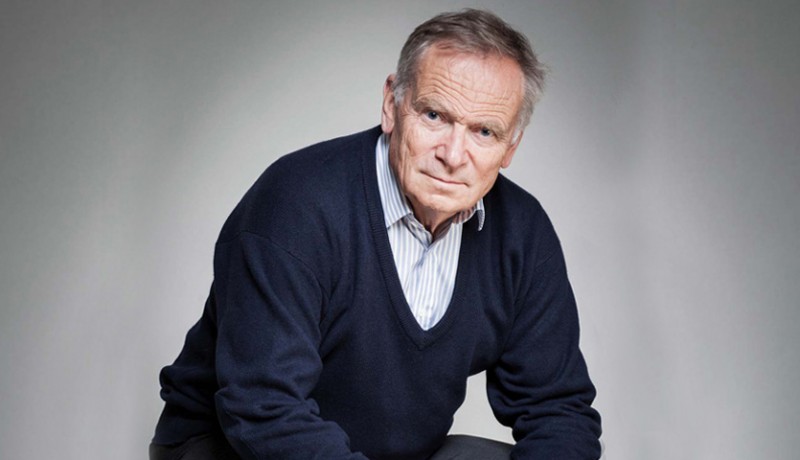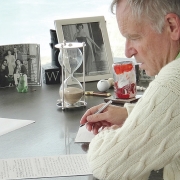
People

Just like his stories, there has never been a dull moment in the life of the master of intrigue and suspense Jeffrey Archer, writes Srirekha Pillai
His life is the stuff his stories are made of—full of intrigue, twists and turns. Jeffrey Archer’s fans have grown accustomed to the master storyteller’s ability to spring surprises through his plots. His life, too, has been dramatic enough. In a case of life imitating art, Archer has survived near-bankruptcy, political resignations, controversies and a prison term. Yet, he has bounced back every single time.
Archer, who turned writer to pay off his debts at the age of 35 with Not A Penny More, Not A Penny Less, is one of the most prolific authors today. At 76, he is busy churning yarn after another, which top bestseller charts. The final instalment of the ‘Clifton Chronicles’—a series of seven novels—This Was A Man (Pan Macmillan India; ₹ 599; 400 pages) has just released, but the storyteller has already moved on to his next, an anthology of 12 short stories scheduled for next year. In fact, for over 40 years, Archer has stuck to a gruelling writing schedule, which sees him working in two-hour shifts alternating with two hours of break, from 6 am to 9 pm. “I always think three pages in advance,” he says. The first draft of each book is conjured up in his luxury villa in Majorca—a group of islands that is part of Spain—named ‘Writer’s Block’ in his signature tongue-in-cheek English humour. A strict disciplinarian, Archer doesn’t compromise on his hourly gym routine thrice a week.
As part of his continent-hopping publicity exercise for the final series of the Clifton Chronicles—a gripping family saga spanning the 20th century that captures the trials and tribulations of the Cliftons and Barringtons, two families at opposite ends of the social spectrum—Archer was in India recently on a tight four-city tour, zipping between Gurgaon, Bengaluru, Pune and Mumbai. Interestingly, India, the largest market of his books, has found mention in Cometh The Hour, the penultimate book of the Clifton Chronicles, besides the short story And Thereby Hangs A Tale.
Elected a Member of Parliament at the age of 29 and appointed deputy chairman of the Conservative Party much later, Archer’s brush with politics was rocked by scandals. But he remained the blue-eyed boy of former British prime minister and Conservative Party leader Margaret Thatcher. Another lady who has stood by him through thick and thin is his wife Mary Doreen Weeden, a scientist specialising in solar power conversion, whom he met at Oxford University. The couple has two sons, theatre producer William Archer and James Archer, a financial advisor and businessman.
In an email interview from London, Archer, whose bestsellers include Kane And Abel, First Among Equals and Cat O’ Nine Tales, talks about the future of publishing, his admiration for Indian storytellers and his lack of technical skills. Excerpts from the interview:
You’ve been living with Harry Clifton and Emma for nearly seven years. Is it difficult to move on?
Yes, but at the same time it’s good to have come to an end after seven volumes and a million words. I’m ready to move on.
You’ve succeeded in pushing gender boundaries with strong women characters. Is it in some way a reflection of the women who have walked into your life?
I am lucky to have had three immensely strong female role models in life: my mother, my wife Mary and, of course, Margaret Thatcher.
When it comes to your political associations, Margaret Thatcher’s name stands out. How has she enriched your life?
It was a privilege to have worked for 11 years for Margaret Thatcher, and both Mary and I consider our lives were more than enriched by her friendship after she had ceased being prime minister.
Now, Britain has another woman leader, Theresa May, while the US just lost a chance to make history with the first woman president. What are your views on it?
I’m delighted we have a second woman prime minister, but should point out that in England, Northern Ireland, Scotland and Wales, there are female leaders—the world is a changin’, to quote Mark Twain.
With Brexit and Trump’s victory, will we see a resurgence of right-wing politics and greater insularity across the globe?
What I see from Brexit and Trump’s victory is that the public is fed up with politicians, and anyone who can say, ‘I’ve never been involved in politics,’ has a chance of winning.
It is said you wanted to be an orator because you loved the way words formed.
I’ve always loved the theatre and was hooked when, as a teenager, I first saw Laurence Olivier playing Coriolanus at the Royal Shakespeare Company in Stratford-upon-Avon. That performance was the beginning of a lifelong love of the theatre. And so it’s no surprise that I’ve always loved great oratory. However, it never crossed my mind that I’d be making a living out of putting those words on paper!
Is it ironic that you have a villa named Writer’s Block, though apparently you’ve never suffered from one?
I think I named my home Writer’s Block to remind myself how lucky I’ve been over the years, and I hope that it lasts!
I hear you have a Ganesha in your writing room!
Yes, that’s true. I do have an intricately carved wooden Ganesha in my writing room overlooking the sea, and I am grateful for his assistance.
India is one of your largest markets. Besides that, what is it about India that appeals to you?
I have immense affection for the people of India, not least for their love of books, and enthusiasm for reading and, of course, have always enjoyed the cricketing battles over the years.
You’ve been acquainted with Mansoor Ali Khan Pataudi since your Oxford days. What are your memories?
I first met Mansoor in the 1960s when he was captain of the Oxford cricket team, and a much-loved figure. It was a friendship that lasted many decades, and I was only too delighted recently to do an auction in London for his daughter Soha Ali Khan’s charity.
Talking about your love for cricket, which is your favourite cricketing team in the world besides England?
I do not love any other cricket team; they are all the enemy.
You managed to get The Beatles to tour your college.
The Beatles very kindly came to Oxford to support the charity Oxfam in their 21st year, and the Daily Mail managed to raise £ 1 million—a vast amount of money at the time—to support Oxfam’s overseas work.
Do you see the Clifton Chronicles being adapted for television one day just like Kane and Abel and First Among Equals?
I only wish! Now the seven books are finished, I hope someone will want to make it into a television series.
You’re known to be a great admirer of R K Narayan. Who are the other Indian writers you love to read?
R K Narayan is one of the great storytellers of his time, and Malgudi Days is a work of genius. I also admire Vikram Seth, not least because he’s a polymath. He seems to have done everything except open the batting for India!
Are e-books the future?
We have to accept that e-books are here to stay and will take a large part of the market. However, there’s no reason to believe, particularly in India, that the book will be overtaken. Because the majority still prefer to ‘have and to hold’ a book rather than read on a screen.
In an interview with Harmony-Celebrate Age in 2011, you said you’d like to learn to operate the computer. How tech-friendly have you become?
I still handwrite every word of my books, and my technical ability stretches to turning on a light…and often forgetting to turn it off!
You’re quite active on Twitter. Do you manage it yourself?
No, I’m not capable of doing any social media without the help of my personal assistant, Alison Prince.
You’ve set a rigorous writing schedule for yourself, from 6 am to 9 pm. With so much success coming your way, have you ever gone easy on your schedule?
Certainly not. You set yourself the task and stick to it. If you relax your routine or think I’ll just start work again a bit later, it’s very easy to find an excuse not to do the next session at all.
You seem to be getting better with age. What is the secret of your longevity as a writer?
I think since I’ve given up politics and can concentrate fully on writing, I’ve managed to produce better work.
CLIFTON CHRONICLES
Only Time Will Tell
The Sins Of The Father
Best Kept Secret
Be Careful What You Wish For
Mightier Than The Sword
Cometh The Hour
This Was A Man
HIS FAVOURITES
Indian book:
Malgudi Days
Indian cricketer:
Sunil Gavaskar—
“I dreaded him coming to the crease”
Indian food:
Mild chicken curry
Photographs courtesy: Pan Macmillan India Featured in Harmony — Celebrate Age Magazine January 2017
you may also like to read
-
For the love of Sanskrit
During her 60s, if you had told Sushila A that she would be securing a doctorate in Sanskrit in the….
-
Style sensation
Meet Instagram star Moon Lin Cocking a snook at ageism, this nonagenarian Taiwanese woman is slaying street fashion like….
-
Beauty and her beast
Meet Instagram star Linda Rodin Most beauty and style influencers on Instagram hope to launch their beauty line someday…..
-
Cooking up a storm!
Meet Instagram star Shanthi Ramachandran In today’s web-fuelled world, you can now get recipes for your favourite dishes at….









